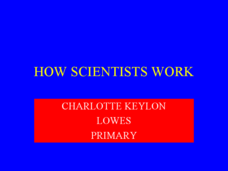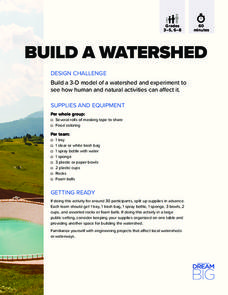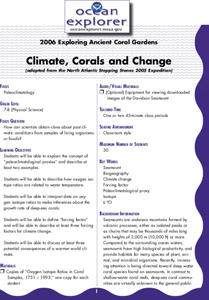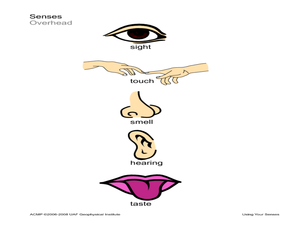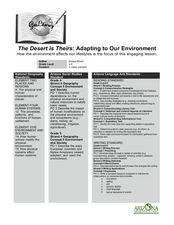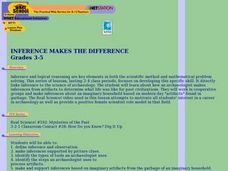Chicago Botanic Garden
Recognizing Change (Observation vs. Inference)
What is the difference between making inferences and making observations? Young climatologists refer to a PowerPoint to make observations on each slide. They record their observations in a provided worksheet before drawing a...
Curated OER
Observation and Inference
Assess your young scientists' understanding of the difference between observation and inference with this 20-question multiple choice quiz. It reviews a variety of physics and astronomy concepts, such as solar eclipses and sunspots, the...
Colorado State University
If You Can't Predict the Weather, How Can You Predict the Climate?
Why is the weather man wrong so often? Young climatologists discover how chaos rules both weather and climate through a math-based activity. Using an iterative equation, the class examines how small day-to-day weather events total up to...
Curated OER
Making Regolith
You may not be able to take a field trip to the moon, but that doesn't mean your class can't study moon rocks. Using graham crackers as the moon's bedrock and powdered donuts as micrometeorites, young scientists simulate...
Have Fun Teaching
Growing Seeds (9)
A seed, water, and sunlight. A seed, water, but no sunlight. A seed, sunlight, but no water. Young biologists are ask to infer what will happen to seeds given five different growing conditions.
Curated OER
Process Skills Review: Observation, Inference, and Predictions
A simple worksheet asks science learners to define five terms and identify five statements as predictions, observations, or inferences. This would be a supportive assignment when introducing elementary-levle scientist to inquiry practices.
UAF Geophysical Institute
Observing the Weather
How can you predict the weather without any technology? Young scientists learn to forecast the weather using traditional Native American techniques. Based on their observations of the weather, as well as talking to their classmates, they...
Curated OER
Trends Forecasting
Learners practice trends forecasting to predict the weather. In this forecasting lesson plan, students learn how meteorologists predict the weather by looking at weather trends. They then predict their own forecast, analyze the results,...
Curated OER
How Scientists Work
The arsenal of tools a scientist uses to observe the world are varied. This great presentation gives students a look at some of the strategies they should use when looking at the world around them. The information can be used as a...
Curated OER
Measuring Snowfall
Students predict the amount of snowfall for the week and measure snowfall. In this measuring snowfall instructional activity, student use a precipitation gauge to measure the week's snowfall; and analyze the data to determine...
Curated OER
Decision Making
Students study weather patterns and learn to make decisions based on the weather. In this weather lesson, students plan a potluck based on the weather. Students use a decision tree to brainstorm about the activity. Students complete a...
Curated OER
The Frog and the Ol' Black Fly
Students explore frogs. In this cross curriculum literacy and frogs lesson, students predict the plot and then listen to the book The Wide-Mouthed Frog by Keith Faulkner. Students define "predator" and identify foods a frog might...
NOAA
Off Base
How does carbon dioxide affect the world's oceans? The final installment in a series of six lessons has pupils research ocean acidification, then conduct an experiment to witness the delicate balance that exists in our seas. Materials...
DiscoverE
Build a Watershed
What's the best way to learn how watersheds work? Build one! Combining engineering, the water cycle, and ecology concerns, the activity is the perfect fit for an interdisciplinary unit. Teams construct a model watershed with simple...
NOAA
Climate, Corals and Change
Global warming isn't just an issue on land; deep ocean waters are also showing troubling signs. Young scientists learn more about deep water corals and the many recent discoveries researchers have made. Then they examine data related to...
Integrated Physics and Chemistry
Law of Conservation of Matter
Does mass change during a chemical reaction? Demonstrate the Law of Conservation of Matter while encouraging class members to be creative with a two-part lesson. First, learners use Alka-Seltzer® tablets and water to demonstrate the...
Curated OER
Using Your Senses
Students make observations. In this sensory skills lesson, students use their senses as well as tools that sharpen their senses to make observations regarding foods and other items.
Curated OER
Food for Spaceflight
When astronauts get hungry in outer space, they can't just call and have a pizza delivered. In order to gain an appreciation for the challenges associated with space travel, young learners are given the task of selecting,...
Workforce Solutions
On the Job
Four lessons spotlight a variety of professions while boosting listening and observational skills and making inferences. Lesson one challenges pupils to group cards based on a commonality then justify the relationship they see....
Curated OER
Mixed Up Chameleon
Students discover facts about chameleons. In this adaptations lesson, students read a book about chameleons and discuss the adaptations they have to survive. Students also discuss predator and prey of the chameleon. Students make...
University of Colorado
The Moons of Jupiter
Middle schoolers analyze given data on density and diameter of objects in space by graphing the data and then discussing their findings. This ninth installment of a 22-part series emphasizes the Galilean moons as compared to other...
University of Colorado
The Moons of Jupiter
Can you name the three planets with rings in our solar system? Everyone knows Saturn, many know Uranus, but most people are surprised to learn that Jupiter also has a ring. The third in a series of six teaches pupils what is around...
Curated OER
The Desert is Theirs: Adapting to Our Environment
Students determine how animals and people adapt to the desert environment. In this desert lesson, students review vocabulary about the desert and how humans have to make changes to accommodate their environments. They listen to and...
Curated OER
Inference Makes the Difference
Students explore how archaeologists make inferences from artifacts to explore what life was like in the past. In this archaeology lesson, students work in groups and make inferences about an imaginary household based on modern day...








